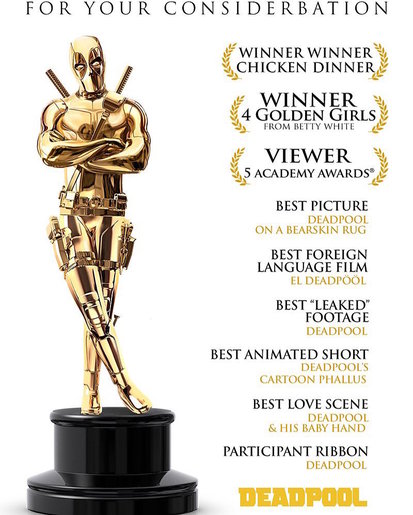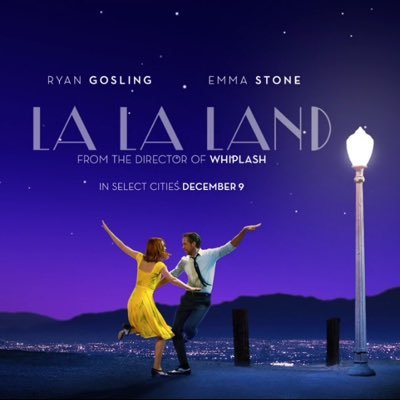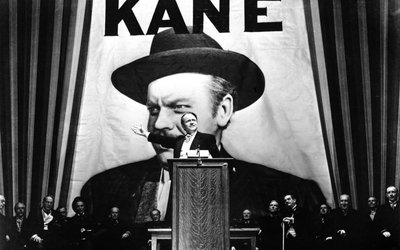The Oscars...what are they good for?
Following last year's #OscarsSoWhite controversy, the Academy Awards came under increasing pressure to become more representative of the film industry and society at large.
Many are expecting this year's ceremony to be defined by anti-Trump speeches, but are the awards themselves relevant to the film industry and to filmgoers?
Below we debate that very question and invite you to vote on it....are the Oscars an irrelevance?
Following last year's #OscarsSoWhite controversy, the Academy Awards came under increasing pressure to become more representative of the film industry and society at large.
Many are expecting this year's ceremony to be defined by anti-Trump speeches, but are the awards themselves relevant to the film industry and to filmgoers?
Below we debate that very question and invite you to vote on it....are the Oscars an irrelevance?
Proposition
Minister for History, Leonhard Balk:
Everybody in my close bubble of friends, family and colleagues hates the Oscars. I do too. It’s easy to hate the Oscars: The ceremony is overblown, self-aggrandizing and, if we’re being honest, mostly unnecessary. The awards take into consideration very few films, often ignoring genre films and forgetting about releases from earlier in the year (though this has gotten a bit better). The politics of the Oscars and its dubious voting mechanism have proven far more interesting than the actual awards, with many blogs seemingly sharing the same attitude towards the whole spectacle.
The only valid justification for the ceremony’s scale and the hype surrounding it every year that I have heard is, that it helps smaller, independent films break out into the mainstream. It’s true that films like “Manchester by the Sea” or “Moonlight” profited tremendously from the Oscar hype surrounding them. The entire platform-release model for independent films (which premiere mostly at Sundance, are then bought by a distributor and then slowly gain theatres and Oscar traction throughout the year) is balanced delicately on awards recognition. However, the question that was put before us is not “do the Oscars help the film industry?”, but rather: “are the Oscars irrelevant?”
Here is the definition of “relevant” which Google just presented to me: “appropriate to the current time, period, or circumstances; of contemporary interest.” A lot has been written about the large, mostly white, mostly male, mostly close to death voting body of the Academy. And yes, this year saw the Academy making up for their deficit in diversity by inviting a record-breaking number of new members into the fold. The true problem, however, lies with the Academy’s strict rules for eligibility and the absurd campaigning surrounding the nomination process.
In an age where the theatrical market has become completely oversaturated and lack of funding for mid-budget films has grown more and more severe, forcing a huge divide between 150-200 mil. Blockbusters and 1-5 mil. Indies, this way of compiling nominations seem completely outdated. Not only are Oscar hopefuls required to screen their film in “Los Angeles County […] for a qualifying run of at least seven consecutive days, during which period screenings must occur at least three times daily”, but they must also be careful to push back potential VOD releases and be sure to advertise “in a manner normal and customary to theatrical feature distribution practices” (whatever that means). You can look up the complete rules for eligibility yourself.
These, however, are only the official requirements for being shortlisted. The unofficial side of things favours studio productions even more, as Oscar hopefuls, to gain the attention of elderly Hollywood producers, will have to send out screeners and gift baskets, throw parties and pay for an additional batch of `For Your Consideration´ ads. It’s an elite club, where influence and money matters more than anything. This, probably, isn’t all that new. The thing that has changed over the last decade or so, is that the film market has become increasingly more diverse and niche-oriented. If you’re still relying on major studios to fill your Oscar ballot, then you’re simply missing out on a lot of truly interesting films, which actually deserve to be recognized.
My appeal to the Academy, for them to become relevant: Stop feeding into the `Oscar bait´ cycle. Encourage your members to seek out interesting films year-round, instead of relying on end-of-year screeners and high-profile campaigns to attract their attention. Widen your eligibility rules to include smaller, more obscure releases. And please, try to keep your ceremony under 4 hours this time
Everybody in my close bubble of friends, family and colleagues hates the Oscars. I do too. It’s easy to hate the Oscars: The ceremony is overblown, self-aggrandizing and, if we’re being honest, mostly unnecessary. The awards take into consideration very few films, often ignoring genre films and forgetting about releases from earlier in the year (though this has gotten a bit better). The politics of the Oscars and its dubious voting mechanism have proven far more interesting than the actual awards, with many blogs seemingly sharing the same attitude towards the whole spectacle.
The only valid justification for the ceremony’s scale and the hype surrounding it every year that I have heard is, that it helps smaller, independent films break out into the mainstream. It’s true that films like “Manchester by the Sea” or “Moonlight” profited tremendously from the Oscar hype surrounding them. The entire platform-release model for independent films (which premiere mostly at Sundance, are then bought by a distributor and then slowly gain theatres and Oscar traction throughout the year) is balanced delicately on awards recognition. However, the question that was put before us is not “do the Oscars help the film industry?”, but rather: “are the Oscars irrelevant?”
Here is the definition of “relevant” which Google just presented to me: “appropriate to the current time, period, or circumstances; of contemporary interest.” A lot has been written about the large, mostly white, mostly male, mostly close to death voting body of the Academy. And yes, this year saw the Academy making up for their deficit in diversity by inviting a record-breaking number of new members into the fold. The true problem, however, lies with the Academy’s strict rules for eligibility and the absurd campaigning surrounding the nomination process.
In an age where the theatrical market has become completely oversaturated and lack of funding for mid-budget films has grown more and more severe, forcing a huge divide between 150-200 mil. Blockbusters and 1-5 mil. Indies, this way of compiling nominations seem completely outdated. Not only are Oscar hopefuls required to screen their film in “Los Angeles County […] for a qualifying run of at least seven consecutive days, during which period screenings must occur at least three times daily”, but they must also be careful to push back potential VOD releases and be sure to advertise “in a manner normal and customary to theatrical feature distribution practices” (whatever that means). You can look up the complete rules for eligibility yourself.
These, however, are only the official requirements for being shortlisted. The unofficial side of things favours studio productions even more, as Oscar hopefuls, to gain the attention of elderly Hollywood producers, will have to send out screeners and gift baskets, throw parties and pay for an additional batch of `For Your Consideration´ ads. It’s an elite club, where influence and money matters more than anything. This, probably, isn’t all that new. The thing that has changed over the last decade or so, is that the film market has become increasingly more diverse and niche-oriented. If you’re still relying on major studios to fill your Oscar ballot, then you’re simply missing out on a lot of truly interesting films, which actually deserve to be recognized.
My appeal to the Academy, for them to become relevant: Stop feeding into the `Oscar bait´ cycle. Encourage your members to seek out interesting films year-round, instead of relying on end-of-year screeners and high-profile campaigns to attract their attention. Widen your eligibility rules to include smaller, more obscure releases. And please, try to keep your ceremony under 4 hours this time
Opposition
Victor Escobar
I've been watching the Academy Awards since I was able to to change the channel on my own. I used to tune into ABC 7 at about 3 pm to catch all the pre-show coverage, occasions switching over to E! I loved the show, the glamour, and the celebrity.
The idea of the show is a relic. When it comes down to it, it is ultimately a celebration of Hollywood. It's a show in which the entire industry pats itself in the back. As Louis CK said when presenting the award for Best Documentary Short last year, "you came here winners, and you're leaving millionaires." On top of that, the show relies on the host's comedy and sketches and musical performances to fill what is ultimately a bloated broadcast.
You really have to love this stuff to sit through all (hopefully, and that's coming in short) three hours of it. It's not always fun stuff and I highly doubt the "cool kids" are tuning in for Jimmy Kimmel. I'm also fairly positive that most people haven't seen the nominated films and chances are that whether you're a casual movie fan or a hardcore film buff, you're favorite movie wasn't nominated for anything.
But I dig it. Do I think art should compete with other art? No. Do I agree with their choices? Not always. Is it a necessary evil? Yes.
The pragmatist in me believes that we need the ceremony every year because that one telecast generates enough revenue to sustain the Academy for the entire year. This includes film preservation, education, scholarships, museums, and other programs. That alone merits its existence.
But my favorite thing about the Oscars is that for one month, it turns us all into film buffs. You may not agree with their choices but you can not deny that almost every film nominated for Best Picture is truly one of the best films of that given year. It's not like they nominate their films the way the Grammys nominate their nominees. If that were the case, the Transformers series would've had a Best Picture winner among them.
Instead, films like Manchester by the Sea and Moonlight are brought to the forefront. Hell, you could even include La La Land in that. My dad would never see any of these films but you bet his interest in all of them is up after their nominations were announced. If Moonlight were to take the prize, you bet he'll be at the theater next weekend watching it. Whether he likes it or not, the point is that he, along with several others, was exposed to a work of art he would've never found or been drawn to on his own.
Ultimately, the Academy is nominating and putting a spotlight on the classics of tomorrow. Maybe it's because I live in Los Angeles and have to deal with a major subway stop being closed for the entire day because of the event, but the Academy Awards is still a big deal. It's relevant if you care about cinema and in the wake of #OscarsSoWhite, it's gained some social relevancy.
I've been watching the Academy Awards since I was able to to change the channel on my own. I used to tune into ABC 7 at about 3 pm to catch all the pre-show coverage, occasions switching over to E! I loved the show, the glamour, and the celebrity.
The idea of the show is a relic. When it comes down to it, it is ultimately a celebration of Hollywood. It's a show in which the entire industry pats itself in the back. As Louis CK said when presenting the award for Best Documentary Short last year, "you came here winners, and you're leaving millionaires." On top of that, the show relies on the host's comedy and sketches and musical performances to fill what is ultimately a bloated broadcast.
You really have to love this stuff to sit through all (hopefully, and that's coming in short) three hours of it. It's not always fun stuff and I highly doubt the "cool kids" are tuning in for Jimmy Kimmel. I'm also fairly positive that most people haven't seen the nominated films and chances are that whether you're a casual movie fan or a hardcore film buff, you're favorite movie wasn't nominated for anything.
But I dig it. Do I think art should compete with other art? No. Do I agree with their choices? Not always. Is it a necessary evil? Yes.
The pragmatist in me believes that we need the ceremony every year because that one telecast generates enough revenue to sustain the Academy for the entire year. This includes film preservation, education, scholarships, museums, and other programs. That alone merits its existence.
But my favorite thing about the Oscars is that for one month, it turns us all into film buffs. You may not agree with their choices but you can not deny that almost every film nominated for Best Picture is truly one of the best films of that given year. It's not like they nominate their films the way the Grammys nominate their nominees. If that were the case, the Transformers series would've had a Best Picture winner among them.
Instead, films like Manchester by the Sea and Moonlight are brought to the forefront. Hell, you could even include La La Land in that. My dad would never see any of these films but you bet his interest in all of them is up after their nominations were announced. If Moonlight were to take the prize, you bet he'll be at the theater next weekend watching it. Whether he likes it or not, the point is that he, along with several others, was exposed to a work of art he would've never found or been drawn to on his own.
Ultimately, the Academy is nominating and putting a spotlight on the classics of tomorrow. Maybe it's because I live in Los Angeles and have to deal with a major subway stop being closed for the entire day because of the event, but the Academy Awards is still a big deal. It's relevant if you care about cinema and in the wake of #OscarsSoWhite, it's gained some social relevancy.
Proposition
Prime Minister, Michael Dalton:
Of course the Oscars are an irrelevance. Looking back at the history of cinema, most of the medium’s most beloved films and filmmakers never won Oscars. Stanley Kubrick and Alfred Hitchcock never won Best Director. Meanwhile, Citizen Kane, the default ‘greatest film of all-time’ didn’t win Best Picture. Today, the highest-grossing films at the box office rarely correlate with what is recognized by the Oscars.
Now yes, the highest-grossing films at the box office are rarely of sufficient quality to warrant awards attention, but nevertheless, it shows a palpable disconnect between the films that the public enjoys, and the ones that the Oscars recognize. And even when there is a crossover between the two, popular genre films are still shut out from the ultimate prize of Best Picture. Mad Max and Gravity, despite their hauls in the technical categories, didn’t win Best Picture. Meanwhile, the failure to even nominate The Dark Knight in that category, incentivized the Oscars to embark on a desperate push for relevance, the messy consequences of which are still felt to this day. How many Best Picture nominees are there again?
At the best of times, watching a bunch of Hollywood stars pat themselves on the back for films that most people haven’t seen feels like an indulgence. Even more so at times of political unrest and turmoil. Awards shows are intrinsically self-congratulatory affairs, and only represent a search for the consensus at the time. Voted for by the film industry, they’re only truly relevant within that same bubble.
This doesn't mean that the Oscars aren't important. The #OscarsSoWhite controversy was so huge precisely because the Oscars matter. Over the years they've achieved a position of cultural significance, which means that people do pay attention to the decisions that they make. However, as that controversy showed, the voting body is out of touch with modern society, and even with the film industry it supposedly represents. The push for diversity in membership will hopefully result in more diverse winners, but at the end of the day as long as it is an award of the film industry, by the film industry, for the film industry, it's true relevance beyond that bubble will always be slim.
The question that I would ask is this, if the Oscars were to be taken away tomorrow and we never had another ceremony, would there be any great loss? Films are made, seen, and passed down through the generations not because of some golden statues…but because they manage to find a space in our collective memories. The names and films that I mentioned at the start, Kubrick, Hitchcock, Citizen Kane…even recent fare such as The Dark Knight, they didn’t need Oscars to go down in history. Yes, the Oscars are important but in terms of determining a film’s worth, success and longevity…they’re an irrelevance.
Of course the Oscars are an irrelevance. Looking back at the history of cinema, most of the medium’s most beloved films and filmmakers never won Oscars. Stanley Kubrick and Alfred Hitchcock never won Best Director. Meanwhile, Citizen Kane, the default ‘greatest film of all-time’ didn’t win Best Picture. Today, the highest-grossing films at the box office rarely correlate with what is recognized by the Oscars.
Now yes, the highest-grossing films at the box office are rarely of sufficient quality to warrant awards attention, but nevertheless, it shows a palpable disconnect between the films that the public enjoys, and the ones that the Oscars recognize. And even when there is a crossover between the two, popular genre films are still shut out from the ultimate prize of Best Picture. Mad Max and Gravity, despite their hauls in the technical categories, didn’t win Best Picture. Meanwhile, the failure to even nominate The Dark Knight in that category, incentivized the Oscars to embark on a desperate push for relevance, the messy consequences of which are still felt to this day. How many Best Picture nominees are there again?
At the best of times, watching a bunch of Hollywood stars pat themselves on the back for films that most people haven’t seen feels like an indulgence. Even more so at times of political unrest and turmoil. Awards shows are intrinsically self-congratulatory affairs, and only represent a search for the consensus at the time. Voted for by the film industry, they’re only truly relevant within that same bubble.
This doesn't mean that the Oscars aren't important. The #OscarsSoWhite controversy was so huge precisely because the Oscars matter. Over the years they've achieved a position of cultural significance, which means that people do pay attention to the decisions that they make. However, as that controversy showed, the voting body is out of touch with modern society, and even with the film industry it supposedly represents. The push for diversity in membership will hopefully result in more diverse winners, but at the end of the day as long as it is an award of the film industry, by the film industry, for the film industry, it's true relevance beyond that bubble will always be slim.
The question that I would ask is this, if the Oscars were to be taken away tomorrow and we never had another ceremony, would there be any great loss? Films are made, seen, and passed down through the generations not because of some golden statues…but because they manage to find a space in our collective memories. The names and films that I mentioned at the start, Kubrick, Hitchcock, Citizen Kane…even recent fare such as The Dark Knight, they didn’t need Oscars to go down in history. Yes, the Oscars are important but in terms of determining a film’s worth, success and longevity…they’re an irrelevance.
Opposition
Minister for Foreign Affairs, Arnaud Trouve:
Every film buff knows that the real “Happy New Year” is shouted on Oscar Night, when the awards season officially comes to a close. (In 2017 it may happen a bit later, after our very own Movie Parliament Awards where you are all invited to vote until March 3rd: www.movieparliament.com/awards2016)
But the thing is, after the BAFTA, César, Goya, ... the last and most famous ceremony is still the Oscars. More than 90 years after its inception, this giant publicity stunt made for Hollywood has never faded. And while there’s always an #OscarsSoWhite or a few mishaps, we’re still eager to know the decisions of those 6,000 Academy members.
What makes them still relevant? First, the US film industry is still the #1 entertainment source for a large part of the Western world. Even if it’s been overshadowed by TV in recent years (see our previous discussion here on www.movieparliament.com), its impact and global embrace is undeniable. Then, it’s also inclusive to any foreign actor, director of craftspeople, regardless of its nationality.
This may seem obvious, but it’s actually quite rare to have such a diverse artistic batch, being judged by such a powerful & massive assembly. This isn’t like Cannes, Venice or Berlin, where a 10-person Jury changes every year. Here, we have the same large amount of people reflecting on art, (and such on society, politics, ...) and their voice is broadcast live around the world, on billions of screens. And those people try to optimize their process, make mistakes, learn by fixing them, ... They’re not perfect (and will never be), but at least they try to.
And for the random moviegoer, an Oscar is still representative of “objective” value, and also announces something that will be “entertaining”. A Best Picture Oscar will always give more traction to a film than a Palme d’Or. And that’s okay because their purpose will never be exactly the same. A single Oscar nomination is enough to change the life of a film and its crew.
Those winners can also change some lives too, or at least give hope to struggling artists or people around the world. I myself got inspired by a bunch of Oscar speeches: Adrien Brody ‘s surprise & plea for peace (2002), Marcia Gay Harden’s gracefulness (2000), Ang Lee’s serenity (2005 & 2012), Steven Soderbergh’s humility (2000): “There are a lot of people to thank. Rather than thank some of them publicly, I think I'll thank all of them privately. What I want to say is -- I want to thank anyone who spends part of their day creating. I don't care if it's a book, a film, a painting, a dance, a piece of theater, a piece of music... Anybody who spends part of their day sharing their experience with us. I think this world would be unlivable without art, and I thank you. “
I’ll finish by singling out some of the most relevant nominations or wins of recent Oscar nights:
1995 - Oscars are the only main awards to acknowledge the performance of Anna Paquin, who’s 11 when she wins Best Supporting Actress for The Piano, underlining that child actors can be on par with older thespians.
2002 - Embracing the global landscape of the film world, Oscars award an anime (Spirited Away) for Best Animated Feature, a film entirely spoken in Spanish for Best Original Screenplay (Talk to Her), while Michael Moore’s anti-Bush diatribe gets talked about worldwide (Best Documentary for “Bowling for Columbine”).
2004 - A song sung in French is nominated (“Vois sur ton chemin” from The Chorus), while another French-language film (A Very Long Engagement) is up for Cinematography & Art Direction.
2015 - Oscars are the only to award the VFX for Ex Machina (if you except the very British BIFA).
Every film buff knows that the real “Happy New Year” is shouted on Oscar Night, when the awards season officially comes to a close. (In 2017 it may happen a bit later, after our very own Movie Parliament Awards where you are all invited to vote until March 3rd: www.movieparliament.com/awards2016)
But the thing is, after the BAFTA, César, Goya, ... the last and most famous ceremony is still the Oscars. More than 90 years after its inception, this giant publicity stunt made for Hollywood has never faded. And while there’s always an #OscarsSoWhite or a few mishaps, we’re still eager to know the decisions of those 6,000 Academy members.
What makes them still relevant? First, the US film industry is still the #1 entertainment source for a large part of the Western world. Even if it’s been overshadowed by TV in recent years (see our previous discussion here on www.movieparliament.com), its impact and global embrace is undeniable. Then, it’s also inclusive to any foreign actor, director of craftspeople, regardless of its nationality.
This may seem obvious, but it’s actually quite rare to have such a diverse artistic batch, being judged by such a powerful & massive assembly. This isn’t like Cannes, Venice or Berlin, where a 10-person Jury changes every year. Here, we have the same large amount of people reflecting on art, (and such on society, politics, ...) and their voice is broadcast live around the world, on billions of screens. And those people try to optimize their process, make mistakes, learn by fixing them, ... They’re not perfect (and will never be), but at least they try to.
And for the random moviegoer, an Oscar is still representative of “objective” value, and also announces something that will be “entertaining”. A Best Picture Oscar will always give more traction to a film than a Palme d’Or. And that’s okay because their purpose will never be exactly the same. A single Oscar nomination is enough to change the life of a film and its crew.
Those winners can also change some lives too, or at least give hope to struggling artists or people around the world. I myself got inspired by a bunch of Oscar speeches: Adrien Brody ‘s surprise & plea for peace (2002), Marcia Gay Harden’s gracefulness (2000), Ang Lee’s serenity (2005 & 2012), Steven Soderbergh’s humility (2000): “There are a lot of people to thank. Rather than thank some of them publicly, I think I'll thank all of them privately. What I want to say is -- I want to thank anyone who spends part of their day creating. I don't care if it's a book, a film, a painting, a dance, a piece of theater, a piece of music... Anybody who spends part of their day sharing their experience with us. I think this world would be unlivable without art, and I thank you. “
I’ll finish by singling out some of the most relevant nominations or wins of recent Oscar nights:
1995 - Oscars are the only main awards to acknowledge the performance of Anna Paquin, who’s 11 when she wins Best Supporting Actress for The Piano, underlining that child actors can be on par with older thespians.
2002 - Embracing the global landscape of the film world, Oscars award an anime (Spirited Away) for Best Animated Feature, a film entirely spoken in Spanish for Best Original Screenplay (Talk to Her), while Michael Moore’s anti-Bush diatribe gets talked about worldwide (Best Documentary for “Bowling for Columbine”).
2004 - A song sung in French is nominated (“Vois sur ton chemin” from The Chorus), while another French-language film (A Very Long Engagement) is up for Cinematography & Art Direction.
2015 - Oscars are the only to award the VFX for Ex Machina (if you except the very British BIFA).
Closing Remarks
What do you think? Are the Oscars relevant? Or are they simply a self-congratulatory irrelevance? Does it matter what wins? How much recognition do you give their choices? Would film be worse off without the Oscars? Give us your thoughts in the comments below and let us know whether you agree with the proposition or opposition.








 RSS Feed
RSS Feed
